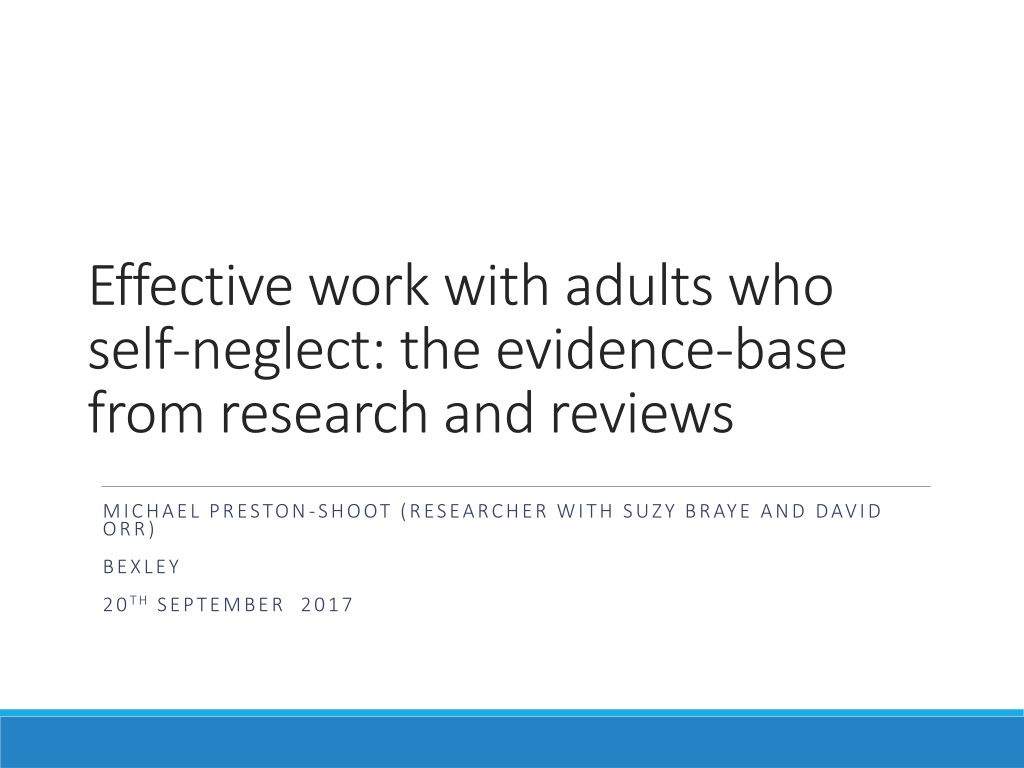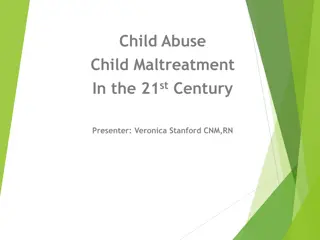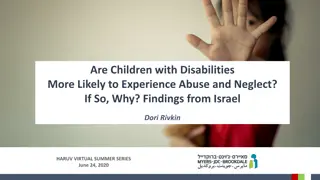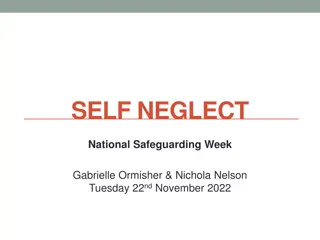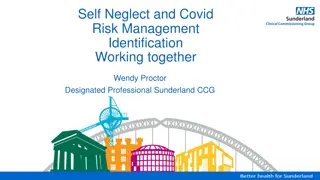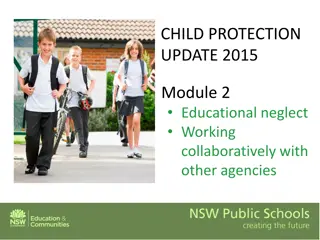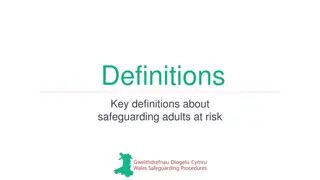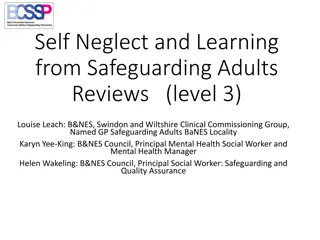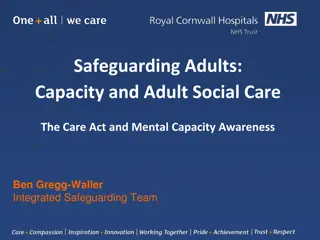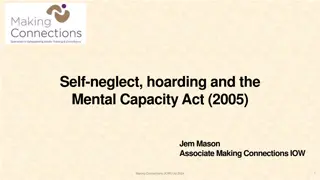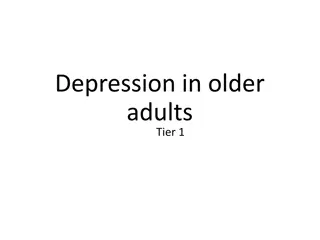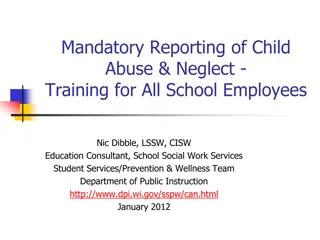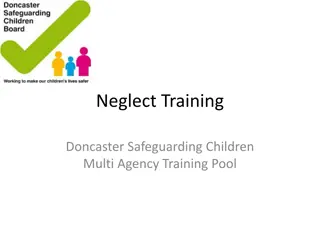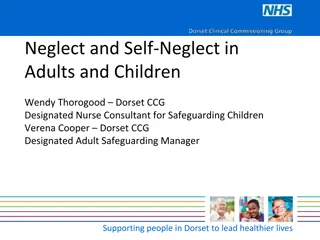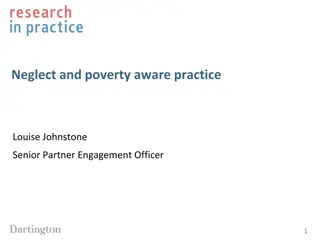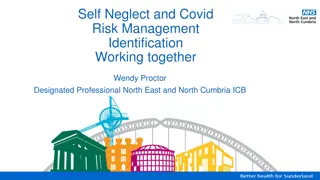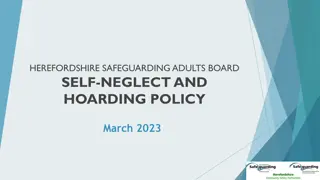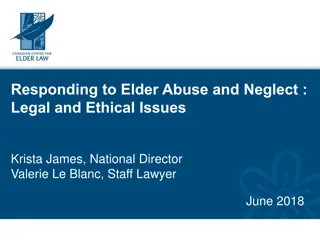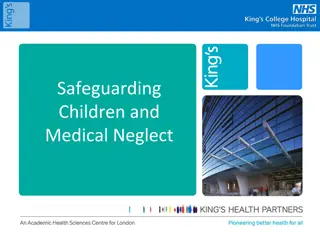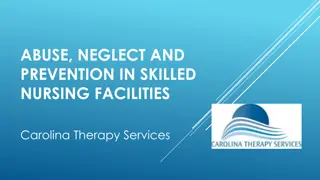Understanding Self-Neglect in Adults: Challenges and Research Insights
This content delves into the complex issue of self-neglect in adults, covering its definition, key challenges, and the research evidence available. It explores the various aspects of self-neglect, including neglect of self-care, domestic environment, and refusal of services. The challenges associated with self-neglect are discussed, such as workplace factors, legal literacy, ethical dilemmas, and interagency cooperation. The content emphasizes the importance of understanding the individual's life experience in the context of self-neglect. The lived experiences of individuals struggling with self-neglect are also highlighted, shedding light on the negative self-image, demotivation, and indifference to social appearance that can contribute to self-neglect behaviors.
Download Presentation

Please find below an Image/Link to download the presentation.
The content on the website is provided AS IS for your information and personal use only. It may not be sold, licensed, or shared on other websites without obtaining consent from the author. Download presentation by click this link. If you encounter any issues during the download, it is possible that the publisher has removed the file from their server.
E N D
Presentation Transcript
Effective work with adults who self-neglect: the evidence-base from research and reviews MICHAEL PRESTON-SHOOT (RESEARCHER WITH SUZY BRAYE AND DAVID ORR) BEXLEY 20THSEPTEMBER 2017
Self-neglect: the research evidence Review of serious case reviews Workforce development needs Exploring self-neglect practice Scoping the evidence on self-neglect SAB governance 2014-17 2013 2013-14
What do we mean by self-neglect? NEGLECT OF SELF-CARE NEGLECT OF THE DOMESTIC ENVIRONMENT Hoarding: ( persistent difficulty discarding or parting with possessions, regardless of value DSM V ) Personal hygiene Nutrition/hydration Health Squalor Infestation To such an extent as to endanger health, safety and/or wellbeing Refusal of services that would mitigate risk of harm Self-neglect: this covers a wide range of behaviour neglecting to care for one s personal hygiene, health or surroundings and includes behaviour such as hoarding (DH 2016)
The key challenges of self-neglect: how can the research help? Workplace factors What s going on? Legal literacy Ethical/ ideological dilemmas Interagency cooperation Mental capacity
1. Whats going on? No one overarching explanatory model Complex interplay of physical, mental, social, personal and environmental factors Need for understanding the meaning of self-neglect in the context of each individual s life experience
Understanding lived experience: neglect of self-care I got it into my head that I m unimportant, so it doesn t matter what I look like or what I smell like. Negative self-image: demotivation I m drinking, I m not washing; I wouldn t say I m losing the will to live, that s a bit strong, but I don t care, I just don t care. Different standards: indifference to social appearance I wouldn t say I let my standards slip; I didn t have much standards to start with. Inability to self-care: (It) makes me tired ... I get tired because daily routines are exhausting me, to do the simple things like get washed, put on clean clothes, wash my hair. I always neglected my own feelings for instance, and I didn t address them, didn t look at them in fact, I thought no, no, my feelings don t come into it .
Understanding lived experience: neglect of domestic environment The only way I kept toys was hiding them. Influence of the past: childhood, loss Positive value of hoarding: a sense of connection, utility When I was a little boy, the war had just started; everything had a value to me everything in my eyes then, and indeed now, has potential use Beyond control: voices, obsessions I want things that belonged to people so that they have a connection to me. The distress of not collecting is more than the distress of doing it. I don t have time to make a note of everything in the paper that has an interest to me and so I m very fearful of throwing something away.
2. Ethical dilemmas arise from competing imperatives Respect for autonomy & self- determination Duty to protect and promote dignity The duty to protect from foreseeable harm Human dignity compromised Human rights principles Risk to others Professional codes of ethics Human rights principles Legislation (MCA) Limitations to state power Policy context of personalisation and making safeguarding personal
The core dilemma The fact is that all life involves risk, and the young, the elderly and the vulnerable are exposed to additional risks and to risks they are less well equipped than others to cope with. But just as wise parents resist the temptation to keep their children metaphorically wrapped up in cotton wool, so too we must avoid the temptation always to put the physical health and safety of the elderly and the vulnerable before everything else. Often it will be appropriate to do so, but not always. Physical health and welfare can sometimes be bought at too high a price in happiness and emotional welfare. The emphasis must be on sensible risk appraisal, not striving to avoid all risk, whatever the price, but instead seeking a proper balance and being willing to tolerate manageable or acceptable risks as the price appropriately to be paid in order to achieve some other good in particular to achieve the vital good of the elderly or vulnerable person s happiness. What good it is making someone safer if it merely makes them miserable? MM (An Adult)[2007]
Why choice and control are not synonymous in self-neglect Well I don t know to be honest. Suddenly one day you think, What am I doing here? I wouldn t say I m losing the will to live, that s a bit strong but I don t care. I just don t care. I can t physically bend down and pick things up. I put everyone else first and that s how the self-neglect started. I used to wake up in the morning and cry when I saw the sheer overwhelming state... My war experience in Eastern Europe was scary, but nothing compared to what I was experiencing here. I got it in my head that I m unimportant, so it doesn t matter what I look like or what I smell like. I always neglected my own feelings, for instance, and I didn t address them ... I thought, no, no, my feelings don t come into it, she s more important. I wouldn t say I let my standards slip; I didn t have much standards to start with.
A more nuanced approach Respect for autonomy may entail Protection does not mean Respecting lifestyle choice isn t the problem; it's where people don't think they re worth anything different, or they don t know what the options are. Questioning lifestyle choice Denial of wishes and feelings Respectful challenge Removal of all risk Autonomy does not mean abandonment Protection entails proportionate risk reduction
A relational approach: ethical action situated within relationship She got it into my head that I am important, that I am on this earth for a reason. They all said, we re not here to condemn you, we re here to help you and I couldn t believe it. I thought I was going to get an enormous bollocking. Intervention delivered through relationship: emotional connection/trust He has been human, that s the word I can use; he has been human. Support that fits with the individual s own perception of need/utility: practical input Tenancy support weren t helping just leaving it for me to do. Whereas when x came, they were sort of hands on: Bumph! We ve got to do this shall we start cleaning up now? He s down to earth, he doesn t beat around the bush. If there is something wrong he will tell you. If he thinks you need to get this sorted, he will tell you. Respectful and honest engagement The idea is not to get too pushy about it; people start getting panicky then, you know? You re interfering in my life, that kinda thing. With me if you re too bossy, I will put my feet down and go like a stubborn mule; I will just sit and just fester.
3. Mental capacity: affects perception of risk and intervention focus Mental capacity Respect autonomy ? Self-care Self-neglect Best Best interests: preventive interests: remedial Mental incapacity
14 An enhanced understanding of mental capacity Mental capacity involves The ability to understand and reason through a decision AND the ability to enact it in the moment Decisional capacity Capacity Impaired executive function (frontal lobe impairment) affects Understanding, retaining, using and weighing relevant information in real-time problem-solving Executive capacity Articulate and demonstrate models of assessment GW v A Local Authority [2014] EWCOP20
4. Legal literacy Inherent jurisdiction Data Care Act 2014 Protection Act 1998 Mental Health Act 1983 Mental Capacity Act 2005 Beyond health & social care Powers of entry MCA 2005 DoL
Practitioners and managers need to: Have sound knowledge of the legal rules in adult social care: Powers and duties for intervention + Principles of administrative law Be able to identify how real world circumstances fit those legal rules Abide by a professional code of ethics Ensure that human rights are observed Be confident in identifying options, weighing their respective merits, and justifying the choices made
Sound knowledge of legal rules The ability to connect relevant legal rules with the professional priorities and objectives of ethical practice Strong engagement with professional ethics Principles of human rights, equality and social justice Consideration of which agencies have duties and powers, and how they might be applied in any given situation
Reflected in administrative law requirements on decision-making Public authorities must act lawfully Not exceed their powers Respect human rights Promote equalities They must observe standards in the use of statutory authority Make timely decisions Take account of all relevant considerations Avoid bias Share information and consult Provide a rationale for the exercise of discretion Professional codes of conduct include acting lawfully
The legal literacy map Substantive law Constructing and defending a legally literate intervention Principles Case law Standards
And of course legal literacy has to connect with other literacies What must an and may we do? How? Relationship literacy Legal rules Why? Human development/mental health What works? Research findings
5. The organisational context Care management models Thresholds that limit preventive work *Time limited, set stages Charging policies *Closure pending review Performance management Features of the local care market
A perfect storm The combination of people who are terrified of losing their independence or terrified of state intervention, together with a state process that is desperate to apply eligibility criteria and find reasons not to support people, is just lethal.... It s just like: oh you re saying it s all fine, thank goodness, we can go away . Organisational pressures Reluctance to engage
Creating a supportive organisational environment Supervision and support Recognition of the personal impact Support and challenge Time for a slow burn approach Workflow that permits repeat visits and longer-term engagement Shared risk management & decision-making Places & spaces to discuss: panels/forums
6. Interagency cooperation: case review findings Failure of escalation & challenge to poor service standards Failure to think family Lack of leadership and coordination Legal literacy Mental capacity Failures of communication Learning about working together Collective omission of the mundane and the obvious Work on uncoordinated parallel lines
Example SCRs/SARs Gemma Hayter Warwickshire no agency took responsibility for young disabled adult WD Waltham Forest what is a lifestyle choice when living in squalor? Ellen Ash Glasgow a complex mother/son relationship, repeating pattern not addressed ZZ Camden changing behaviour not challenged by home care staff Mr C Bristol (2016) capacity assumed, impact of organisational capacity, inconsistent multi-agency working, interface between mental health and drug use, anti-social behaviour, legal literacy on section 117 MHS 1983 Anon - Barnsley (2010) inflexible agency responses Ms F - West Berkshire complex family with co-dependent needs Adult D Newcastle son preventing agencies from addressing his father s needs Adult A - North Tyneside failure to collect repeat prescriptions for type 2 diabetes not noticed by the health centre; utility company did not raise an alert A1 Birmingham failure to liaise with psychiatrist over a capacity assessment and with Ambulance Trust over hospital admission
SARs focusing on primary care Mr V Isle of Wight discharge planning should involve all agencies and carers, capacity assessments to be recorded, use expertise of specific healthcare professionals Mr W Isle of Wight importance of liaison between GPs and District Nurses, and sharing of safeguarding concerns across agencies; demanding workloads KH Gloucestershire importance of precise referrals, and of community nurses reporting concerns; demanding workloads; disguised compliance Ted Gloucestershire district nursing service in turmoil , understaffed and being reorganised, importance of full information in hospital discharge letters, review repeat prescriptions BB and CC Islington multi-agency meetings must share information, analysis and agree action plans; importance of liaison between GPs, OTs and care agency Importance of liaison and information-exchange, medication and repeat prescription reviews, training in mental capacity and mental health law (SARs by SABs in Surrey, Newcastle, Tower Hamlets, Kent and Medway, Slough, Mental Welfare Commission Scotland)
Thematic Analysis Adult History explore questions why; curiosity Person-centred approach be proactive, address patterns Hard to reach try different approaches, use advocates and concerned others, raise concerns, discuss risks, maintain contact, avoid case closure Mental capacity ongoing assessment & review, guidance for staff regarding people with capacity who refuse services and are at risk Autonomy & life style choice an increasing focus (Adult A North Tyneside, B & C South Tyneside, Mr I West Berkshire, W Isle of Wight, and several Gloucestershire cases OO, R, AT and KH) Carers offer assessments, concerned curiosity & challenge, explore family dynamics and repeating patterns, engage neighbours and non-resident family members
Thematic Analysis Team around the Adult Recording clarity & thoroughness of work done, agreed plans, outcomes achieved, discussions held Legal literacy know and consider available law Safeguarding literacy awareness of guidance & procedures, of risks and vulnerabilities, of safeguarding systems; adequate exploration of apparent choices Working together silo working, threshold bouncing, inflexible agency responses, shared assessments & plans, liaison & challenge, follow-through Information sharing Advocacy consider use with hard to engage people Use of procedures DNAs, safeguarding alerts, risk assessments Standards of good practice thoroughness of assessments, challenge professional optimism, lack of assertiveness & curiosity, authoritative practice
Thematic Analysis Organisations around the Team Support cases are complex, high risk, stressful & demanding, so support systems essential; review scope and adequacy of policies Culture encourage challenge & escalation of concerns; balance personalisation with duty of care; review case management approach Supervision & managerial oversight senior managers should take responsibility for overseeing complex cases; effective supervision; use risk panels; audit cases Staffing practitioners must have appropriate experience & resilience; review allocation of work; mindful of health & safety
Thematic Analysis LSAB around the Organisations Conducting SCRs involve family & carers, avoid delay Monitoring & action planning robust action plans and audits of impact needed Procedures & guidance develop protocols on risk & capacity assessments, follow up of service refusal, cases where adults have capacity but at risk of harm Use of SCR across LSABs, in training, with government departments, for procedural development Training on mental capacity, law, procedures, writing IMRs, on person- centred approach & strategies to engage people; evidence outcomes
What makes for robust interagency working? Shared strategic ownership and understandings Interagency governance Clarity on roles and responsibilities Forum for shared risk management Referral pathways Commissioning Turning strategy into operational reality Training, supervision, support Space for relationship- based work Case coordination and leadership
Whole system alignment Multi-agency governance Organisational infrastucture Legal and ethical literacy Relationship The person 32
Knowing, Doing and Being Knowing Being I think the only thing that will help that is concern, another human being connecting with you that s got a little bit more strength than you, that pulls you through those forms of depression, that s what keeps you alive. Doing Relationship
Integrating negotiated and imposed interventions
In summary: practitioner approaches Practice with people who self-neglect is more effective where practitioners Build rapport and trust, showing respect, empathy, persistence, and continuity Seek to understand the meaning and significance of the self-neglect, taking account of the individual s life experience Work patiently at the pace of the individual, but know when to make the most of moments of motivation to secure changes Keep constantly in view the question of the individual s mental capacity to make self-care decisions Communicate about risks and options with honesty and openness, particularly where coercive action is a possibility Ensure that options for intervention are rooted in sound understanding of legal powers and duties Think flexibly about how family members and community resources can contribute to interventions, building on relationships and networks Work proactively to engage and co-ordinate agencies with specialist expertise to contribute towards shared goals 35
In summary: organisational approaches Effective practice is best supported organisationally when Strategic responsibility for self-neglect is clearly located within a shared interagency governance arrangement such as the SAB Agencies share definitions and understandings of self-neglect Interagency coordination and shared risk-management is facilitated by clear referral routes, communication and decision-making systems Longer-term supportive, relationship-based involvement is accepted as a pattern of work Training and supervision challenge and support practitioners to engage with the ethical challenges, legal options, skills and emotions involved in self-neglect practice 36
Research reports Braye, S., Orr, D. and Preston-Shoot, M. (2011) Self-Neglect and Adult Safeguarding: Findings from Research. London: SCIE. http://www.scie.org.uk/publications/reports/report46.pdf Braye, S., Orr, D. and Preston-Shoot, M. (2013) A Scoping Study of Workforce Development for Self-Neglect. London: Skills for Care. http://www.skillsforcare.org.uk/NMDS-SC-intelligence-research-and- innovation/evidence-impact/Research-reports/Workforce-development-for-self- neglect.aspx Braye. S., Orr, D. and Preston-Shoot, M. (2014) Self-Neglect Policy & Practice: Building an Evidence Base for Adult Social Care. London: SCIE. (Summary reports also available) http://www.scie.org.uk/publications/reports/69-self-neglect-policy- practice-building-an-evidence-base-for-adult-social-care/ Also available are 3 shorter summary reports: for managers, for practitioners and for a general audience.
Journal articles Braye, S., Orr, D. and Preston-Shoot, M. (2011) Conceptualising and responding to self-neglect: challenges for adult safeguarding , Journal of Adult Protection, 13, 4, 182-193. Braye, S., Preston-Shoot, M. and Orr, D (2012) The governance of adult safeguarding: findings from research , Journal of Adult Protection, 14, 2, 55-72. Braye, S., Orr, D. and Preston-Shoot, M. (2015) Learning lessons about self-neglect? An analysis of serious case reviews , Journal of Adult Protection, 17, 1, 3-18. Braye, S., Orr, D. and Preston-Shoot, M. (2015) Serious case review findings on the challenges of self-neglect: indicators for good practice , Journal of Adult Protection (17, 2, 75-87). Preston-Shoot, M. (2016) Towards explanations for the findings of serious case reviews: understanding what happens in self-neglect work, Journal of Adult Protection, 18(3), 131-148. Preston-Shoot, M. (2017) On Self-Neglect and Safeguarding Adult Reviews: Diminishing Returns or Adding Value? Journal of Adult Protection, 19(2), 53-66.
Key contacts Please contact us if you have any queries: Professor Suzy Braye, s.braye@sussex.ac.uk David Orr, d.orr@sussex.ac.uk Professor Michael Preston-Shoot, michael.preston-shoot@beds.ac.uk
